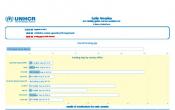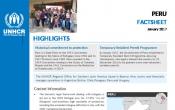Argentina Regional Office
The UNHCR Regional Office for Southern Latin America based in Buenos Aires covers operations in Argentina, Bolivia, Chile, Paraguay, Peru and Uruguay.
Operation: Argentina Regional Office
Location
{"longitude":-65,"latitude":-34,"zoom_level":4}
Latest update of camps and office locations 21 Nov 2016. By clicking on the icons on the map, additional information is displayed.
Key Figures
| 2018 planning figures | |
| 90% | of status determination procedures will meet UNHCR’s minimum procedural standards |
| 90% | of resettlement programmes in new or emerging resettlement countries have been established or improved |
| 87% | of domestic laws on protection of stateless persons will be consistent with international standards |
| 83% | of refugees realize social and economic integration |
| 2016 end-year results | |
| 80% | of people of concern had formal access to work opportunitites in host country |
| 68% | of people of concern opting for local integration were locally integrated |
| 5 | out of the 6 countries covered by the Regional Office have taken steps to become party to the Statelessness Conventions |
Latest Updates
People of Concern
93%
Increase in
2016
2016
| 2016 | 20,175 |
| 2015 | 10,428 |
| 2014 | 9,668 |

[["Refugees",7981],["Asylum-seekers",12013],["Others of concern",181]]
Loading ...
Argentina Regional Office
< Back
2016
{"categories":[2013,2014,2015,2016,2017,2018],"budget":[4.3909691,4.38205254,5.149656436,4.81551835,6.06734793,6.350395891],"expenditure":[3.2805336,3.63853125,3.31968324,3.25705897,null,null]}
{"categories":[2013,2014,2015,2016,2017,2018],"p1":[4.26466431,4.31963749,5.063435816,4.64695957,5.85227446,6.186525651],"p2":[0.12630479,0.06241505,0.08622062,0.16855878,0.21507347,0.16387024],"p3":[null,null,null,null,null,null],"p4":[null,null,null,null,null,null]}
{"categories":[2013,2014,2015,2016,2017,2018],"p1":[3.15422915,3.57614911,3.23346262,3.10502305,null,null],"p2":[0.12630445,0.06238214,0.08622062,0.15203592,null,null],"p3":[null,null,null,null,null,null],"p4":[null,null,null,null,null,null]}
Loading ...
CHOOSE A YEAR
- 2015
- 2016
- 2017
- 2018
Year-end Overview
Plan Overview
Working environment
A record spike of new asylum applications since 2016 has placed considerable strain on refugee status determination (RSD) procedures and asylum systems of various southern Latin American countries. At the end of 2016, the number of asylum-seekers in the region stood at some 12,000 people, and by June 2017 the number increased to close to 20,500 asylum-seekers. Governments in the subregion are considering the adoption of measures to control backlogs and reduce increasing numbers of unfounded asylum claims, improving the overall efficiency of their systems.Despite a favourable integration environment in the region, including right to work, access to education and health services, sustainable socio-economic inclusion remains elusive, due to limited access to affordable housing and decent employment opportunities.
Key priorities
In 2018, UNHCR will focus on:- Concluding the diagnosis phase of the Quality Assurance Initiative (QAI), and support implementation of QAI recommendations, in Argentina, Bolivia (Plurinational State of), Chile, and Peru, and by 2019 in Paraguay and Uruguay;
- Including vulnerable people of concern in targeted poverty reduction programmes;
- Working closely with governments to promote the admission of refugees affected by major humanitarian crises through the use of resettlement and alternative legal pathways (humanitarian visa schemes) Argentina pledged to receive 3,000 Syrians, Chile to resettle 120 Syrians, and Uruguay to resettle ten families from the North of Central America.
- Implementing funds from the emerging resettlement countries joint support mechanism (ERCM) to promote sustainable resettlement models.
- Accession to the UN Conventions on Statelessness in Chile, and implementing measures to prevent statelessness, as well as protect and facilitate the naturalization of stateless people in all six countries under the Regional Office.
- Promoting durable solutions, namely ensuring the successful local integration and self-reliance of refugees and the establishment of a sustainable resettlement system.
- Advocating and providing technical support to governments, as well as strengthening public, private and civil society partnerships.













